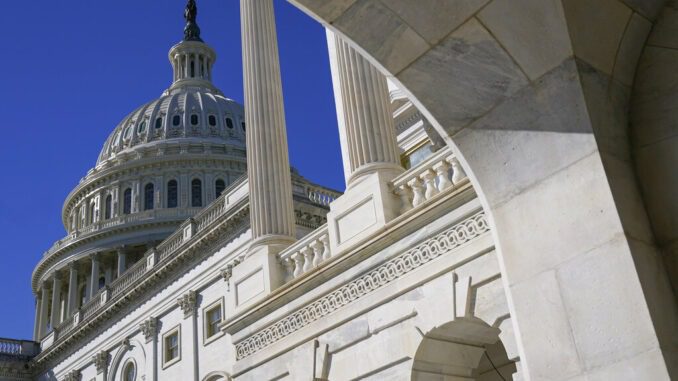
Clever minds have been at work in the U.S. Senate to find a way to circumvent the filibuster — that pesky rule that requires a three-fifths super-majority to end debate and bring a matter to a final vote.
Senate Majority Leader Chuck Schumer appears to have found it under an obscure provision of the Congressional Budget and Impoundment Control Act of 1974. It established Congress’s modern budget and reconciliation process, including budget committees, the Congressional Budget Office, and a timeline that starts with the president proposing a budget.
Importantly, that act envisions one concurrent budget resolution and one “reconciliation” bill for every fiscal year and procedural rules that don’t allow a Senate filibuster.
Schumer has zeroed in on Section 304 of the budget act. It allows Congress to amend budget resolutions. Schumer envisions, apparently, being able to amend the budget they passed in March, which culminated in the $1.9 trillion “American Rescue Plan Act.” And that amendment could direct Congress to pass multiple reconciliation bills within a fiscal year.
Schumer has apparently persuaded the Senate’s parliamentarian, Elizabeth McDonough, to agree with him. So he says, but apparently she placed “parameters” around the idea. We still do not know what they are, since the parliamentarian’s office hasn’t spoken publicly as of this writing. The parliamentarian’s office exists to advise the Senate on procedural matters and rules.
Reconciliation bills implement budget resolutions through spending and tax provisions. It’s how Obamacare became law. It’s how the $1.9 trillion “rescue” bill adopted last month by Congress became law, because Congress last year failed to adopt a budget for this 2021 fiscal year. A Democratic-led House and a then-Republican Senate were never going to agree to one, especially not during a presidential election year. It is likely how the Biden infrastructure and massive tax increases could evade the filibuster and become law with a unified Democratic caucus for the next fiscal year that begins Oct. 1.
Schumer wants to break up the infrastructure spending plan and massive tax increases into two separate “reconciliation” bills. He knows that trying to ram both through both in a single bill is a heavy lift, even for his compliant caucus. He may have ideas for even more reconciliation bills, such as national marijuana legalization.
Persuading the parliamentarian is one thing. Persuading Sen. Joe Manchin (D-WV), and perhaps others, is quite another. Manchin just published an op-ed in the Washington Post where he explicitly pledged to protect and not weaken the filibuster, but also against turning the budget and reconciliation process into “regular order.” Further, members of his own caucus, and even some House Democrats, are beginning to raise concerns about the level of deficit spending. After all, the partisan margins in the House (presently four votes) and Senate (50-50) are the tightest in modern history. At least seven House Democrats represent marginal and competitive congressional districts who will likely face serious re-election challenges in 2022 when the party “out of power” in the White House is favored to gain seats. A lot of them.
Maybe some Democrats don’t want Manchin to have all the fun of being a “deciding vote” on matters in a 50-50 Senate. We will see how courageous they are when their liberal colleagues and hard-nosed progressives buttonhole them.
Some Senate Democrats won’t give up trying to amend the rules or find ways to kill or weaken the filibuster. After all, not everything, such as a $15 minimum wage, election “reform,” as well as the “green new deal” aspects of their agenda, can pass muster under the budget rules. Sen. Manchin, who succeeded the late Robert C. Byrd, says he isn’t going to vote to get rid of the “Byrd Rule,” a unique Senate budget rule that prevents the consideration of non-budget-related “extraneous” items, increasing deficits beyond a specific point, or even tackling our growing Social Security trust fund issues. The parliamentarian ruled against Budget Committee Chairman Bernie Sanders’ plan to impose a $15-per-hour minimum wage as part of the budget, citing the Byrd Rule, and his attempt to overrule failed.
Sen. Schumer may have found a way to ram through a massive tax and spending plan without any Republican support, but he still needs every Democrat in a 50-50 Senate. It’s no way to run a republic, for sure, but here we are.
Cover your wallets.
Kelly D. Johnston is a former secretary of the U.S. Senate.



